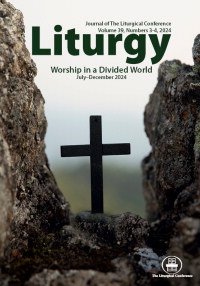In the Current Issue: "Worship in a Divided World"
The issue of Liturgy entitled “Worship in a Divided World,” guest-edited by Benjamin Durheim, seeks to explore where our worshipping communities stand with regard to divisions that have pulled Christian worship patterns in divergent directions both negatively and, especially in recent times, positively as strengths. This excerpt is the second half of his Introduction, offering quick glimpses of several of the essays from a range of scholars whose work helps us to think deeply about context and expected practices as we seek to be one body. –– Melinda Quivik
~ ~ ~ ~ ~
This issue of Liturgy adds a series of new and emerging voices who approach questions of worshiping in a divided world with a diverse set of methods and concerns. The articles in this volume comprise a conversation that approaches division from perspectives that value worship and liturgical practice not simply as antidotes to division, but as deeply human expressions of religion and spirituality that must take account of division’s potency and particular effects. Hansol Goo explores the liturgical experiences of worshipers whose worship spaces are shared between groups of different cultural or ethnic backgrounds, especially in relation to immigration. Brian Hehn and Emorja Roberson bring to bear two case studies focused on experiences in cross-cultural and transcultural worship and music that illuminate ways that worship has unfolded in contexts of division.
From perspectives of preaching and proclamation, Leah Schade draws from a six-year research project investigating ministry and church life in politically diverse congregations in order to craft a method for preaching in politically divided contexts. LaRyssa D. Herrington examines Karl Barth’s theology of proclamation through a Black Catholic lens and applies it to social movements in divided contexts such as the Black Lives Matter movement.
Attending to experiences of division within worship itself, Samantha Slaubaugh examines how the inertia of liturgical practice affects those with life-threatening food allergies, and suggests ways to think about reforming worship practices to be more liberative. Interfacing with the discipline of theological ethics, Xavier Montecel brings the virtue ethics tradition to bear on sacramental theology, asking what sacraments do if understood through the lens of virtue. Daniella Zsupan-Jerome, writing from the discipline of practical theology, approaches the question of polarization by presenting a Benedictine liturgical practice—statio—as a liturgically illuminative practice for ordering a community toward stability and commitment even in contexts of division. Also included is a statement crafted by theologians from the Seminar on the Way, a body at the North American Academy of Liturgy that has discerned and suggested liturgical ways forward in the context of remaining Lutheran-Roman Catholic division.
The voices of the authors in this issue bring to bear a creativity and wisdom that helps throw new light on particular questions of worship in a divided world. I am deeply grateful to them for their work and energy in crafting these pieces, and I am so glad to have a part in sharing their work with Liturgy’s readers and the wider church.
~ ~ ~ ~ ~
Benjamin Durheim is an assistant professor of theology at the College of Saint Benedict and Saint John’s University in Minnesota, where he teaches courses in liturgical/sacramental theology and theological ethics. His publications have centered on the intersection between liturgy and ethics as in Christ’s Gift, Our Response (Liturgical Press, 2015) and also articles on social ethics, liturgical and sacramental practice, ecumenism, and rural Christianity.
Benjamin Durheim, “Introduction: Worship in a Divided World,” Liturgy 39, nos. 3–4 (2024): 91–92, https://doi.org/10.1080/0458063X.2024.2369488.
